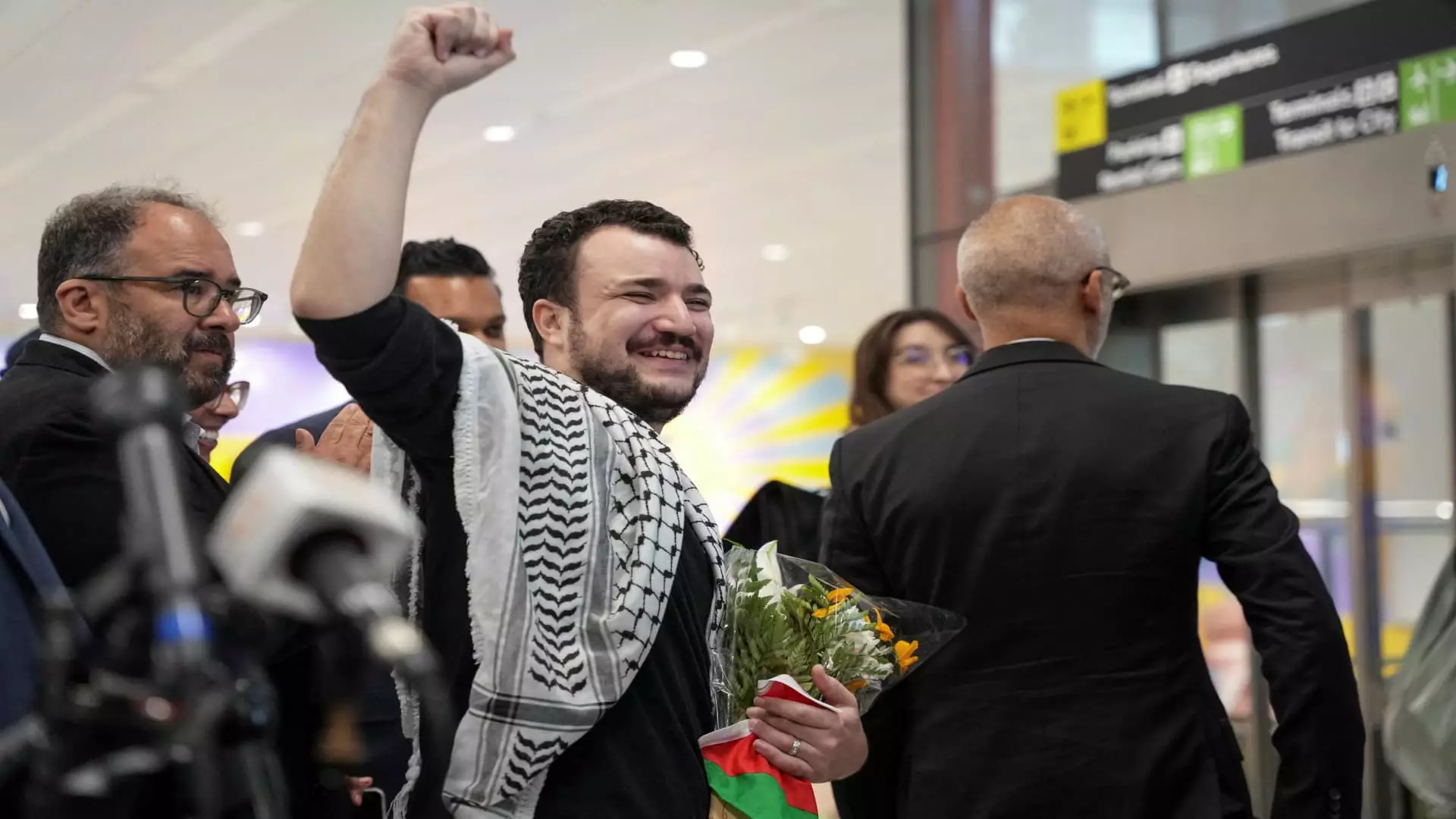The return of Columbia University student Mahmoud Khalil to Newark highlights a dark chapter in the battle for free speech and human rights in America. Khalil’s lengthy detention by Immigration and Customs Enforcement (ICE) for participating in political protests against the actions of the Israeli government and the complicity of U.S. institutions sets a hazardous precedent. The stark reality that a university student can face detention for voicing political dissent raises serious concerns about the state of civil liberties in the country. It’s not merely an isolated incident; it reflects a systematic crackdown on voices advocating for the rights of the Palestinian people, which begs the question: Are we truly living in a free society?
In every corner of the political spectrum, the dangers of state-sanctioned persecution based on political beliefs should evoke a visceral response. Khalil’s defiance upon his release, stating, “Even if they would kill me, I would still speak up for Gaza,” sends ripples through the hearts of those committed to justice. It is an appeal for solidarity that transcends borders and political affiliations. And yet, the tragic irony lies in the fact that he is not alone in this fight; his story is but one among many who have faced similar injustices simply for speaking out.
The Thorny Path of Justice
What distinguishes Khalil’s situation is not just the personal struggle, but the public outcry that ensued. Representative Alexandria Ocasio-Cortez’s vocal support illuminates how critical this issue has become. She asserts that the persecution Khalil faced represents a violation of First Amendment rights, a perspective that resonates across ideological lines. Regardless of one’s stance on the Israel-Palestine conflict, it is indisputable that silencing dissent threatens the very fabric of our democracy.
However, the harsh critique of the Trump administration’s combative approach remains crucial. Khalil’s detention under an obscure provision of the Immigration and Nationality Act showcases a troubling tendency toward authoritarianism within the government. Utilizing national security as a facade to strip individuals of their rights is a slippery slope that jeopardizes the foundational tenets of justice. We must question how a person’s advocacy for human rights can be perceived as threatening. If this is the new normal, we should brace ourselves for an escalating climate of fear.
Echoes of Systemic Injustice
While Khalil’s release is a glimmer of hope, the echoes of systemic injustice resonate loudly. The administration’s response, which included an appeal of the court’s ruling, suggests that the struggle for justice does not conclude at mere release but evolves into a persistent battle against a government willing to wield its power against dissenting voices. Moments of victory should not lull us into complacency but inspire continued vigilance. The broader implications for our society can be dire; the detention of outspoken individuals undermines public discourse and quells the spirit of activism.
Furthermore, Khalil’s story is interwoven with those of other foreign academics and activists subjected to the same draconian measures, creating a tapestry of repression fueled by an unsettling political climate. Their experiences serve as cautionary tales that spotlight the fragility of freedom in the modern United States. The trauma of being unlawfully detained, like that of fellow academic Mohsen Mahdawi, amplifies the urgency with which we must examine our immigration policies.
As we witness the chilling effects of these detentions go beyond mere individual cases, the growing animosity towards pro-Palestinian sentiments should evoke alarm bells loud enough to pierce the political facade of neutrality. This is not merely a question of policy; it is a moral battleground where silence equates to complicity. The unfortunate reality is that those who dare to challenge the status quo face repercussions — and the price they pay can be unbearably steep.
The Role of Institutions
Khalil’s story serves as a pivotal moment for institutions like Columbia University, whose complicity in the scenarios unfolding around their students must not go unchecked. The very hallmarks of academic freedom and critical inquiry appear at risk, as the university finds itself caught in the wildfire of geopolitical tensions. The fight for rights must include advocacy against the financial entanglements that allow institutions to profit while remaining quiet in the face of moral crises.
We cannot afford to allow our universities to become merely asylums of complacency under the heavy weight of national and international politics. The promise of education and the sanctity of free thought must be vigorously defended so that they do not dissolve into institutional silence amidst controversy.
This moment in history demands a fierce re-evaluation of our collective conscience. It is time for us to ask whether we are content with merely observing injustice or will we rise to oppose it. Mahmoud Khalil has ignited a spark; now it’s up to us to fan the flames.


Leave a Reply